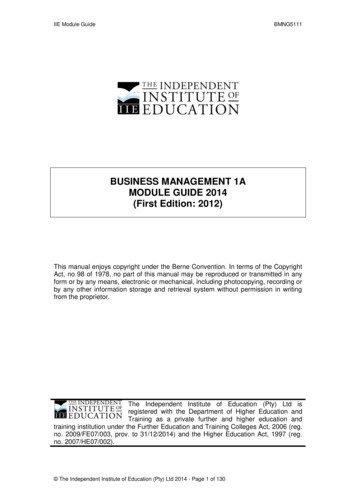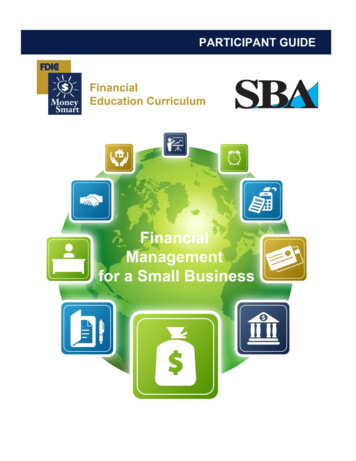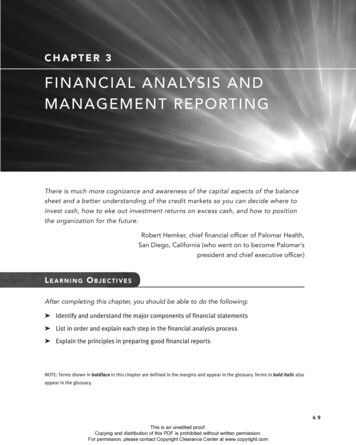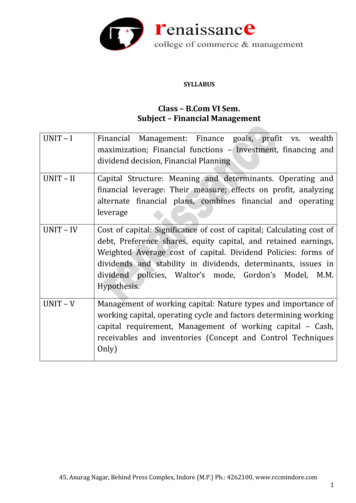
Transcription
Financialmanagement andbusiness success– a guide forentrepreneurs
About ACCAACCA (the Association of Chartered CertifiedAccountants) is the global body for professionalaccountants. It offers business-relevant, first-choicequalifications to people of application, ability andambition around the world who seek a rewardingcareer in accountancy, finance and management.ACCA supports its 178,000 members and 455,000students in 181 countries, helping them to developsuccessful careers in accounting and business, with theskills required by employers. ACCA works through anetwork of 95 offices and centres and more than7,110 Approved Employers worldwide, who providehigh standards of employee learning anddevelopment. Through its public interest remit, ACCApromotes appropriate regulation of accounting andconducts relevant research to ensure accountancycontinues to grow in reputation and influence.Founded in 1904, ACCA has consistently held uniquecore values: opportunity, diversity, innovation, integrityand accountability. It believes that accountants bringvalue to economies in all stages of development andseek to develop capacity in the profession andencourage the adoption of global standards. ACCA’score values are aligned to the needs of employers inall sectors and it ensures that through its range ofqualifications, it prepares accountants for business.ACCA seeks to open up the profession to people ofall backgrounds and remove artificial barriers,innovating its qualifications and delivery to meet thediverse needs of trainee professionals and theiremployers. More information is available at:www.accaglobal.com The Association of Chartered Certified AccountantsMay 2016Financial managementis at the heart ofrunning a successfulbusiness. It affects everyaspect, from managingcash flow and trackingbusiness performanceto developing plans thatensure that businessowners can make themost of opportunities.This guide highlightshow financialmanagement canhelp your business,and how to make sureyou have the financialcapabilities you need.
1. IntroductionThe right financial capabilitiesremain vital throughout thelife of your business, whetheryou are just starting out,have an established businessor are looking towards afinal exit from the business.Your financial managementneeds will continually evolveas the business grows andcircumstances change.3Running a business can be intenselysatisfying but also hugely challenging.Business owners face a multitude ofdemands on their time, balancing the needto prioritise and deal with a range ofurgent tasks while also finding time to lookat the bigger picture.As an entrepreneur, you may well be drivenby a passion for what you offer, and focusedon what customers want and how you cangain an edge on your competitors. You willalso recognise how important it is to beable to raise the financing you need. In fact,financial management can contribute muchmore to achieving your business goals.Business planning helps you identify,assess and capitalise on new opportunities.It lets you think through your options andcreate an action plan that minimises costlymistakes. It is also a crucial tool if you needto convince financiers and others tosupport your business.Skilled financial management is critical forputting your plan into practice. Effectiveadministration, compliance and cash flowmanagement are just the starting point.Financial skills let you track and measureperformances, identify problem areas andnew opportunities, and minimise risks.The right financial capabilities remainvital throughout the life of your business,whether you are just starting out, havean established business or are lookingtowards a final exit from the business.Your financial management needs willcontinually evolve as the business growsand circumstances change.Successful, growing businesses take aproactive approach to financialmanagement and to making sure that theyhave the right capabilities. Financialmanagement plays a continuous role inboth day-to-day management of thebusiness and broader strategic planning.Senior management must recognise howthe needs of the business change as thebusiness grows, and make sure that theorganisation has the financial skills that willhelp the business look to the future.As a business owner or manager, you needto recognise the importance of financialmanagement. You may be able to delegatesome of the tasks involved – to employeesor outside experts, but you yourself needto be always looking ahead, ensuring thatyour business continues to develop thefinancial capabilities it will need to achieveits full potential.
1. Introduction4EPOS NOW – CASE STUDYJacyn Heavens was inspired to startEpos Now by his own experience ofhow difficult it can be to run a businesswithout the right financial informationand controls. Epos Now helps retail andhospitality businesses overcome this byproviding point-of-sale systems that letthem keep track of transactions andunderstand their performance.Before starting Epos Now, Jacyn hadbeen running a café bar. He quicklyrealised that there was a problem.‘I knew how much I was payingsuppliers, and I’m a naturalhaggler, so I was sure I wasgetting a good deal. But I’d onlyknow what our total outgoingswere by looking at the bankstatement. The bar could bebuzzing, full of people, yet I’dhave less at the end of the nightthan I would on what felt like aquiet day.’Jacyn was desperate to know what wasgoing on: what his income really was,what products were selling well, whatmargin he was making and mostimportantly whether the business wasactually profitable.Those difficulties have now proved to bea blessing in disguise. Over the five yearssince Jacyn set up Epos Now, thecompany’s annual turnover has grown toreach 10m, with over 150 employeesand 10,000 customers. Right from thestart, financial management has beencritical to the company’s success.‘Initially, we focused ongrowth in revenue and ourprofit margin. As a self-fundedbusiness absolutely everythingwe did needed to make money.We were living month-tomonth, and cash flow wascrucial. That focus meant wecould cope when the launch ofour first software was delayedby four months. Otherwise,we’d have folded.’As the business has grown, the emphasishas shifted to building predictable,recurring revenue. Quarterly results andfuture trends are more important than theimmediate here and now, and financialmanagement has become more detailed.‘We’ve been profitable overallsince the early days, but nowwe look separately at eachmarketing campaign, eachsource of new sales leads, eachsales channel. Looking back, evenin our most profitable monthswe’ve made big losses on someindividual channels but we neverspotted it at the time.’At the same time, the company hasinvested heavily in automation. Improvedsystems give Jacyn and his teamreal-time access to accurate keyperformance indicators.Despite all the success, Jacyn admitsthat his initial planning was not as goodas it should have been.‘I saw the opportunity in themarket, and thought “let’sgive it a go”, but I’d neverrecommend this now – I gotlucky. I remember the day, lateron, when I met a new employee.I realised we had to have a morestructured approach. With peopledependent on the business fortheir livelihoods, you can’t justrely on gut instinct.’CREATING THE CULTUREDeveloping the right financial capabilities, and making the best use of them, requires the right culture in your business.At the top of the organisation, owners and managers must understand how financial management can contribute to the successof the business. Approaching financial management as a chore to be delegated leaves you at considerable risk if things gowrong. Employees need to see how financial management can help them perform better, rather than merely imposing controlson them. Training is likely to be required for all employees, not just financial specialists.Information should be shared across the business wherever it will help individuals do their jobs and understand how they arecontributing to business success. A reasonable degree of financial transparency can both reassure and motivate staff.Developing advanced financial capabilities will take time and money, and needs to be balanced against other demands on thebusiness. Your business will maximise its success if you plan ahead to see how financial management can help achieve your goals.
2. Business planningWhether you are starting anew venture, looking at newopportunities for an existingbusiness or updating yourstrategy, planning is essential.PLAN FIRSTBusiness planning is not just an exercisethat you have to go through to raisefinancing for your business. Businessplanning has a critical role to play, at everystage in the life of your business.For a busy entrepreneur, it can be difficultto find the time for planning. Working on abusiness plan rarely seems as urgent asmore immediate tasks. Yet whether you arestarting a new venture, looking at newopportunities for an existing business orupdating your strategy, planning is essential.Even if you have no need for externalfunding, regularly reviewing and updatingyour business plan offers significant benefits.Preparing a business plan pushes you toidentify and assess the opportunities andthreats facing your business. It helps ensurethat you have an in-depth understanding ofyour market, the competition and thebroader business environment.Creating the plan forces you to makechoices. Which opportunities will you pursue?How will you trade off conflicting options,such as continuing to invest in new productdevelopment while also controlling costs?5The planning process lets you think throughpossible courses of action and what mighthappen. You plan how you will deal with anychallenges, overcoming any weaknesses yourbusiness may have and making the most ofyour strengths. You can identify potentialpitfalls, such as overstretching yourselffinancially, and work out how to avoid them– without suffering the consequences.Developing the plan also helps you focus onthe assumptions you are making and areasof uncertainty. You can take steps to reduceuncertainty and control risks, or choose toavoid excessively risky opportunitiesaltogether. Anticipating what might happen– good or bad – allows you to think inadvance about how you would respond. Youminimise the risk of being forced to react tounexpected events with hurried decisions.The whole planning process acts as achecklist, helping to ensure that you thinkabout all the important issues and thatnothing is overlooked. You choose whatthe best options are. You decide where tofocus your efforts and what you need to doto give yourself the best chance of success.Without a plan, you are running yourbusiness by trial and error.
2. Business planningBeing part of the planningprocess helps to engagethe team and encourageeveryone to work togethertowards a common goal.6Your approach to planning shouldrecognise and include the whole teaminvolved in the business. That allows you toget their input and make the most of theirknowledge and skills. Being part of theplanning process helps to engage theteam and encourage everyone to worktogether towards a common goal.The completed business plan acts as apowerful communications tool. Within thebusiness, it enables everyone to understandACHIEVING YOUR GOALEffective planning starts with decidingwhat you are trying to achieve and takesthis all the way through to creating arealistic plan. It should encompass allthe following aspects. Your long-term goal. What reallymatters to you? What is the purpose ofyour business? As your business reactsto changing circumstances, how will youkeep on track? Your objectives. What would you like toachieve in the next 12 months, 24months and 36 months? Why have youchosen these targets, now? Is there anopportunity you want to exploit, andwhy do you think it exists? What areothers in your market doing? The strategy. How can you take bestadvantage of the opportunities youhave identified? What are the key risksand how can you control them? Whatassumptions have you made and whatwould it help to know? Tactics. How will you put your strategyinto action? Who will do what, when?what the strategy is and how what they doneeds to fit with it. Externally, you can usethe plan to help explain your business tolenders, investors and other key businesspartners and convince them to support you.Perhaps most importantly, your businessplan provides a blueprint, helping to guideyour day-to-day management of thebusiness. Regular review lets you see howwell the plan is working and how it needsto evolve as circumstances change.‘I’m a businesswoman and I getit. Sometimes having a plan islike driving with a satnav thattakes you the wrong way up a noentry street. But the alternative,no plan, that’s much worse, you’dend up driving in the wrongdirection for miles and the tripends up costing you substantiallymore unnecessarily.’Rhonda A. Best FCCA, Director atAlexander Bain, Member of ACCAGlobal Forum for SMEs Financial review. Can you afford yourplans? Which tactics are likely to be themost cost-effective? How will youmonitor progress?A ‘SWOT analysis’ can be a useful startingpoint. The analysis focuses on identifying thestrengths and weaknesses of your business,and looking at the opportunities and threatsyou face. This helps you to plan the bestway to make the most of your strengthsand take advantage of opportunities whilereducing and controlling risks.‘Are you working hard toachieve continuous businesssuccess? Always keep financialmanagement at the heart ofdecision making.’Uresha Walpitagama FCCA,Director – Staylanka Bookings(Private) Limited, Member of ACCAGlobal Forum for SMEs
2. Business planningThe better yourunderstanding of theenvironment in whichyour business operates,the stronger your planwill be.80%of businesses employfewer than 10 people(OECD, The Dynamics of Employment Growth1)8-14%of companies go outof business each year(ACCA, Financial Education forEntrepreneurs: What Next? 20132)7PLANNING CAPABILITIESPulling together a business plan involves awide range of knowledge and skills.The better your understanding of theenvironment in which your businessoperates, the stronger your plan will be.That includes understanding customerrequirements, what your competitors offerand key market trends. Your understandingof the wider business environment shouldcover regulatory, economic, social andtechnical factors affecting your business.What are the key tax, labour andenvironmental laws? Are there any specialincentives for your type of business?Equally, you need a clear understanding ofyour own business strengths andweaknesses. Your plan needs to cover thefull range of business functions: sales andmarketing, purchasing, production, humanresources, administration and finance.What people, skills, premises, equipmentand financing do you have and what doyou need? What are the particularproblems that are holding you back? Agood plan will be based on hard data andresearch, not just a ‘feeling’ that somethingis a good idea. Wherever possible youshould be talking to customers and testingout ideas before committing yourself.Your completed plan should pull togetherall this information, creating a vision for thebusiness, setting clear objectives andproviding an action plan. You also need tobe able to turn those plans into numbers,with forecasts of the implications for cashflow and profitability.Most entrepreneurs find that they arestrong in some areas of planning, butweaker in others. You can strengthen yourplanning ability by making the most ofeveryone in your business. Individualemployees often have a keenunderstanding of where their particular areaof the business is succeeding – or goingwrong – and how it could be improved.1 y/the-dynamics-of-employment-growth p-fefe.pdfMembership of business associations isoften a helpful step in gaining access todata and information about your particulartype of business.Equally, astute analysis of the data thatyour business holds, such as sales trendsfor particular products or customer groups,can be very revealing. Understanding whathas happened in the past helps you refineyour plans for the future.FINANCIAL EXPERTISEFinancial calculations and forecasts are atthe heart of business planning.Specific, numerical forecasts make it easierto check that your expectations are realistic.How will you achieve any sales growth youare forecasting? Have you taken intoaccount all the costs you are likely to incur?As a believer in your own products orservices, you may be overconfident aboutyour sales prospects. Looking at these inmore detail provides a useful reality check.How many sales calls will you need tomake? What percentage of enquiries willconvert into sales?Pulling your expected revenues and coststogether in a cash flow forecast lets youidentify any expected cash shortfalls inadvance. It gives you time to arrange anyfinancing you need, and helps convincelenders and investors that you have yourfinances under control.You can also vary your assumptions, lookingat different potential outcomes to help youunderstand how risky your business is.What if your sales turn out to be 10% lowerthan expected or a key supplier puts uptheir prices? How can you protect yourselfagainst possibilities like these?Unless you have all the financial andplanning skills you need, you will want toturn to a suitably qualified external advisersuch as your accountant. You may also wantto develop your own skills or those of youremployees. ACCA-X online training offersfree and low-cost courses covering businessplanning and related financial skills.
2. Business planningThe approach you take tomanaging your businessfinances – and even yourpersonal finances – canmake a big difference tohow creditworthy you areseen to be and how keeninvestors would be tosupport you.5%of small start-ups grow to employmore than 10 people within three years8STARTING UPIf you are starting a new business, it is likelythat your resources – both people andmoney – are very limited. At the same time,the decisions you make at this early stage canhave a huge impact on your future prospects.Initially, you may have a choice of differentbusiness structures, such as whether toform a company or a partnership. Yourchoice can affect the legal requirements foryour business, whether your personalassets are at risk, how profits are taxed andso on. You may also want – or be legallyrequired – to organise your business in away that clearly distinguishes between yourpersonal activities, assets and liabilities andthose of your business.The right financing is critical. As well asmaking sure that your business is adequatelyfinanced, you should aim to use the rightkinds of financing. For example, borrowingtoo heavily might make your businessunnecessarily risky and limit your options ifyou need further financing later on.The way you invest your own money, or anyinvestments from friends and family, canalso have important consequences. Youmay want to reduce your risks – forexample, by providing your financing in theform of loans secured against any businessassets. Doing too much to reduce your ownrisk might, however, deter other sources offinance from supporting your business.The approach you take to managing yourbusiness finances – and even your personalfinances – can make a big difference tohow creditworthy you are seen to be andhow keen investors would be to supportyou. Even if you do not require extrafinancing at the outset, you may want thisflexibility as your business grows.A thorough, realistic business plan isparticularly vital at the start-up stage,whether you are seeking external fundingor not. The plan helps you set the rightcourse and avoid many of the mistakes youmight otherwise make.(OECD, The Dynamics of Employment Growth)START-UP ADVICEIn a start-up, recruiting an expert to deal with issues such as those discussed above is unlikely to be an option. Most start-ups findthat their first finance recruit is a bookkeeper rather than a more highly qualified financial manager. Even this tends to be delayeduntil the volume of business justifies it.Instead, financial management is typically the responsibility of the owner-manager. That may not be a bad thing, as it means thatkey decisions are getting the top-level attention they deserve. In practice, however, unless you are an experienced entrepreneuror come from a financial management background, you are unlikely to have the personal expertise needed.The solution is to take the right advice. Your accountant is likely to be your key financial adviser. Involve your accountant at the planning stage to take full advantageof their expertise in areas such as business planning, raising business finance, tax planning and setting up financialmanagement systems. You may be able to involve individuals with business experience and financial expertise in other roles: for example, as a mentoror a non-executive director. Whomever you get support from, check that they have the right expertise and are helping you in the right areas. If you aregoing to rely on a bookkeeper, make sure they know how to prepare a cash flow forecast and will warn you of potential cashflow problems. Once your business is up and running, you are likely to find yourself under constant pressure to deal with urgent tasks ratherthan broader business strategy. Meetings with your accountant and other advisers can help you refocus on the bigger picture.From the outset, your aim should be to look ahead. Your business plan should tell you what you are trying to achieve and thekinds of financial management capabilities you will need to reach your goals.
3. Financing the businessYour business plan – and thecash flow forecasts in it – givesyou a clear indication of thefinancing the business needs.YOUR FINANCING GOALSYour business plan – and the cash flowforecasts in it – gives you a clear indicationof the financing the business needs. Aswell as identifying your initial requirements,the forecasts look forward, identifying whatadditional financing you may need in future.In fact, the right financing can do more thanjust providing the cash your business needsto function: it can also minimise costs andreduce risks. Careful consideration of yourfinancing goals will help you decide whatyour financial priorities are. Although youmay not be able to achieve everything youwould like, you will have a betterunderstanding of which trade-offs you areprepared to accept. Financial strength. You will want toensure that you will be able to cope ifyour business is less financiallysuccessful than you hope or if you face asudden, one-off cost. Financing cost. You will want tominimise the costs of financing, whetherthat means the interest you pay or theshare of the business you give up inreturn for funding.9 F inancial flexibility. Your business shouldretain flexibility, for example so that youcan obtain additional money to help youpursue new opportunities in the future. Business control. You will want to retaincontrol of the business, with lenders andinvestors placing as few restrictions aspossible on what you can do; and youwill want to restrict their entitlement to arole in decision-making. Financial risk. You will want to limit yourpersonal financial risk, and the risks toany family and friends who haveinvested in the business, minimising therisk of losing more than you can afford ifthings go wrong. P ersonal finances. Your financing plansshould take into account how muchincome you require from the business,and to what extent you are prepared tolimit your income in order to reinvest inthe business. Business strategy. Your ability to raisefinancing will determine whether youcan afford to invest for growth or needto focus on controlling costs andgenerating cash.
3. Financing the businessWhatever financing youraise, it is essential toensure that it is used forthe intended purpose asplanned. Losing financialdiscipline by divertingmoney to alternativeprojects, or for personaluse, can be disastrous. 50%of start-ups fail within five years(OECD, Entrepreneurship at a Glance, 20153)10As well as clarifying your goals, building adeeper understanding of your businessfinances helps you demonstrate yourexpertise to potential sources of finance,making it more likely that they will bewilling to support you.UNDERSTANDING YOUR FINANCINGOPTIONSSignificant financial expertise may beneeded to understand and evaluate thedifferent financial options you may have.Your assessment of how much financing youneed will be based on your business plan andthe cash flow forecasts you produce. You alsoneed to be able to assess how much impactuncertain events, such as disappointingsales, could have on your financial position.You need to be aware of the different typesof financing, and the roles they play. Forexample, it makes sense to fund long-terminvestments with long-term loans (or equity)rather than relying on short-term financing.Other options, such as leasing vehicles orequipment rather than purchasing themoutright, may increase your total borrowingcapacity and offer more financial flexibilitythan relying on bank borrowings.Whatever financing options are available,you need to be able to compare theircosts. This might include assessing howinterest payable on borrowings compareswith the less direct costs of equityinvestment. You also need to understandthe tax implications – for example, whetherinterest payments are tax-deductible andwhether you can recover any sales tax paidon equipment that you lease.3if the business climate changes or lendersbecome unwilling to support you.Whatever financing you raise, it isessential to ensure that it is used for theintended purpose as planned. Losingfinancial discipline by diverting money toalternative projects, or for personal use,can be disastrous.WORKING CAPITALUnderstanding the impact of different waysof managing your working capital can beparticularly important.You may be able to reduce your financingneeds significantly by limiting the credityou offer to customers and negotiatingextended credit from suppliers. Activelymanaging the way you collect paymentsfrom customers, for example by chasing upoverdue debts, is likely to be essential.At the same time, you need to consider thebroader business impact of your terms oftrade. You might need to be willing to offercredit terms that match those of yourcompetitors, or find that you are forced toaccept a major customer’s terms if you wantto do business with them. Your financingplans need to take into account customers’real behaviour – for example, in somecountries late payment is almost routine.Working capital can be a significantlimiting factor as sales volumes grow. Youmay need to identify ways of financing this,such as by using factoring to borrowagainst outstanding invoices. Taking out along-term loan might be a better optionthan continually relying on an overdraft.In many cases, businesses find they haverelatively limited financing options: forexample, relying on the owner’s resources orfunding from family and friends. In situationslike these, it is essential to avoid unsuitableforms of finance, such as long-term relianceon informal lending at high interest ratesthat the business cannot afford.Any financing method you use to increaseyour working capital must be carefullyevaluated, in the same way as your otherfinancing needs. If profits are not highenough to cover any extra costs, you mayneed to take deliberate measures to limityour speed of growth.Financial tools such as measuring return oncapital employed can help you comparethe expected profitability of a project withyour cost of financing. A broader analysiscan look at the most appropriate balancebetween different types of financing. Forexample, a business that needs to invest inuncertain, long-term projects should avoidtoo much borrowing. Excessive reliance onshort-term finance can leave you vulnerable‘Many businesses find that tightfinancial control and strongsupplier relationships helpthem avoid the need for extrafinancing altogether’.Rosanna Choi FCCA, PartnerCWCC (Certified PublicAccountants Hong Kong), Chairof ACCA Global Forum for -glance-2015 entrepreneur aag-2015-en#page1
3. Financing the businessUnderstanding all youroptions, and making theright decisions, requiresspecialist expertise.11ACCESSING FINANCING EXPERTISECREDITWORTHINESSUnderstanding all your options, andmaking the right decisions, requiresspecialist expertise. For example, fewentrepreneurs understand the detailedworking of leases, or have the time todevote to finding out more.For banks and other lenders, the security ofthe money they lend you is crucial. As theirreturn is limited to the interest they charge,they focus on risk, assessing howcreditworthy you are.You are likely to turn to your accountant foradvice in some areas. For example, youmight consult your accountant when youneed to make major financing decisions,such as starting a new business or fundinga major expansion.36%of business failures are caused byinadequate financial management(Turnaround Management Society 20144)You might also want your accountant toreview your overall financing structure on aregular basis, alongside preparation ofyour annual accounts.Other financing issues, such as keepingcash flow forecasts up to date andmanaging working capital, will need morefrequent attention. You may want todevelop in-house capabilities to deal withthese as part of your wider approach tobookkeeping and financial control (seepage 13: Financial control).ATTRACTING FINANCEBanks and investors need to beconvinced that you have a good ideaand know what you are doing. Inmany cases, they will want to see abusiness plan demon
Financial management is at the heart of running a successful business. It affects every aspect, from managing cash flow and tracking business performance to developing plans that ensure that business owners can make the most of opportunit











